June 19, 2025 | 19:58 GMT +7
June 19, 2025 | 19:58 GMT +7
Hotline: 0913.378.918
June 19, 2025 | 19:58 GMT +7
Hotline: 0913.378.918
In the account of Mr. Trinh Viet Chien, a resident of Ninh Khang commune, Hoa Lu district, Ninh Binh province, "Rice cultivation is so easy" is no longer a joke.
Chien revealed that he was familiar with the picture of his parents' arduous labor as farmers and that he grew up with the goal to become wealthy in his homeland. He did get knowledge of efficient agricultural production models from every farmer he approached.
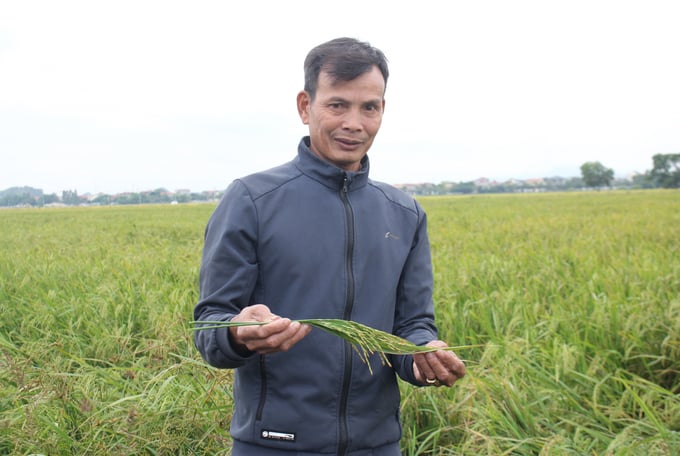
Trinh Viet Chien, Ninh Khang commune, Hoa Lu district (Ninh Binh) succeeded in accumulating land and applying mechanization to rice production. Photo: Le Ben.
"After observing their success with their pig and duck farms, I attempted to replicate their methods. However, I failed due to incorrect livestock farming practices that resulted in animal mortality and sickness, as well as high treatment and preventative expenses. In addition, the prices of animal feeds were rising, whilst the prices of pork and duck were fluctuating, as Chien said.
Then he noticed that a number of agricultural houses in the commune had abandoned their fields as a result of ineffective rice production and that young laborers chose to work in enterprises for a more steady and attractive income. By gathering abandoned farms in his area, he decided to switch to rice cultivation.
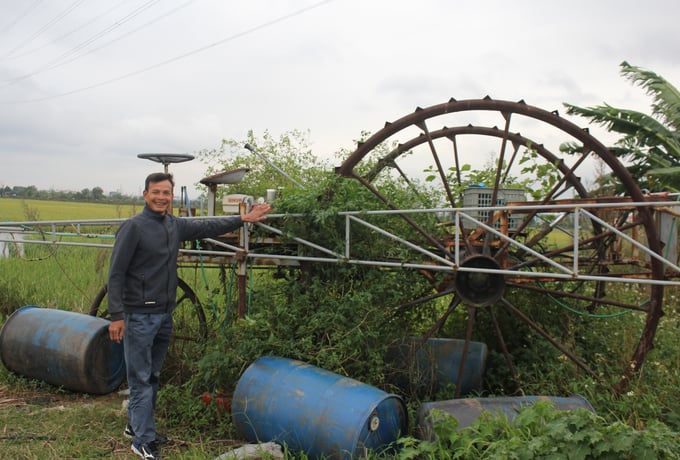
Chien is ready to "abandon" a giant pesticide sprayer worth tens of millions of dong to put the drones into use. Photo: Le Ben.
He rented the abandoned fields for 20 kg of rice per rod each year in addition to service costs, and he now owns around 80 acres of land. When the agricultural area was enlarged, several issues including labor, post-harvest tasks, and poor weather, among others, arose.
Consequently, he acquired several types of plows, harvesters, plant protection sprayers, and drones. In 2021, he invested almost VND 1 billion to construct a rice-drying oven.
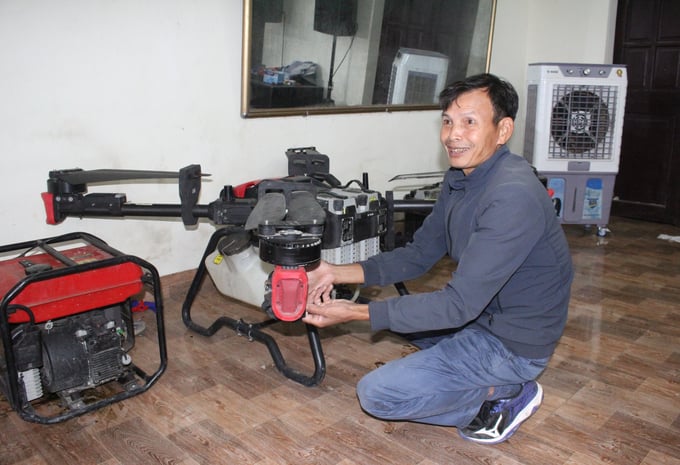
By putting modern machinery and equipment into production, Chien reduced production costs, increased productivity, and facilitated the development of his networks. Photo: Le Ben.
Chien stated that as a result of land acquisition, mechanization, and scientific and technological advancements, production efficiency rose significantly. Machines aid in reducing labor, cutting costs, catching up with the seasonal schedule, and decreasing post-harvest losses...
According to Chien, the manufacturing costs are around VND 600,000 per rod per cop when machinery is used at all phases. In addition, deploying drones makes spraying and fertilizing more efficient, uniform, and cost-effective.
By employing mechanization, the planting schedule is ensured, generating regularity in the care process so that the rice grows and develops healthily, eliminating weather and disease risks, decreasing the cost of fertilizers and pesticides, and minimizing post-harvest losses... The outcome was a 25% increase in rice yield compared to the old conventional approach.
When they collect land, implement automation, and improve in science and technology, it will be much easier to link production and consumption with corporations in terms of consumption.
"When linking with enterprises, the production problem of the product disappears, the purchase price is more stable than if it were sold freely on the market, and packing and handling costs are not wasted. Currently, the corporation is purchasing my rice at a fivefold premium to the market price, as stated by Chien.
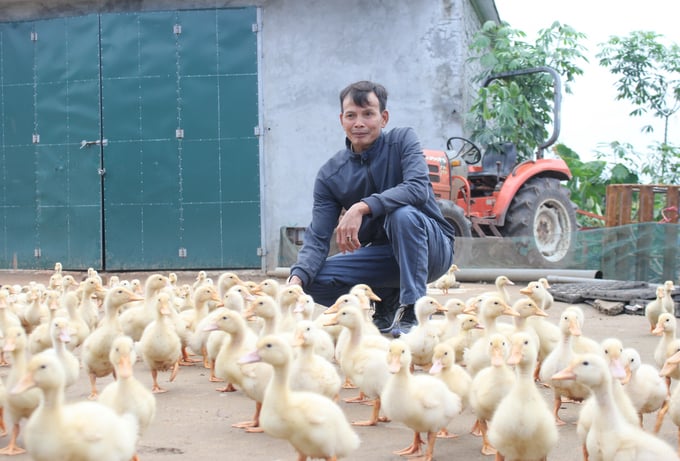
With a large area, Chien combines duck farming and fish stocking, earning hundreds of millions of dong/per year. Photo: Le Ben.
In Decision No. 858/QD-TTg of the Prime Minister dated July 20, 2022, approving the Strategy for mechanization of agriculture and processing of agriculture, forestry, and fishery products by 2030, the term "synchronous mechanization" was introduced and drew the interest of numerous scientists, businesses, cooperatives, and individuals.
Previously, we discussed the employment of machinery, equipment, and technology as a replacement for human work, to ease labor shortages, or to replace human labor with easily automated labor.
From a larger viewpoint, however, the rate of mechanization in agricultural production in a specific region exposes an out-of-sync between stages and phases of the production process, so altering production crop, pest and disease control schedules, and climate uncertainties. In addition, the uneven amount of automation throughout the industrial value chain increases manufacturing costs.
MARD is prepared to suggest to the Prime Minister the issuing of a Decree on Synchronous mechanization comprising directions to: "Develop agriculture's mechanization in the direction of synchronous mechanization, along the production-to-consumption-to-processing chain. Throughout the agricultural production process, promote the use of machinery, equipment, advanced technology, digital technology, and smart technologies."
As a result, the agriculture sector can ensure crop yield, pest and disease control, climate adaptation, and the creation of large-scale models.
Translated by Linh Linh

(VAN) Biodiversity is being threatened by traditional remedies made from wildlife. Traditional medicine and humans must change to live in harmony with nature.

(VAN) Agrifood investment and finance solutions for people and the planet.

(VAN) Microplastic contamination has become pervasive in seafood, posing unprecedented challenges for food safety and marine ecosystems.
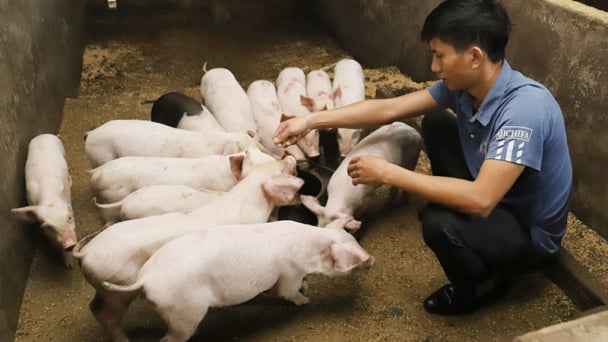
(VAN) Proactively using vaccines, combined with transport control and enhanced surveillance, is the only viable path toward biosecure and sustainable livestock production in Vietnam.

(VAN) Located in the southeast of Ho Chi Minh City, the Can Gio Mangrove Biosphere Reserve is considered the ‘green lung,’ a solid shield protecting the city.

(VAN) To address plastic pollution, closing the plastic recycling cycle will bring significant economic and environmental benefits.

(VAN) According to the Binh Thuan Department of Industry and Trade, in the first five months of 2025, Binh Thuan's dragon fruit export turnover increased by 20.65% compared to the same period last year.